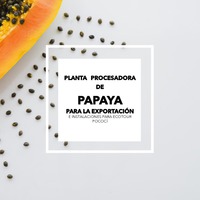| dc.contributor.advisor | Lizano-Picado Carlos | es |
| dc.contributor.author | Cubero-Chavarría, Estefany-Débora | |
| dc.date.accessioned | 2019-03-25T21:11:18Z | |
| dc.date.available | 2019-03-25T21:11:18Z | |
| dc.date.issued | 2018 | |
| dc.identifier.uri | https://hdl.handle.net/2238/10471 | |
| dc.description | Proyecto de graduación (Licenciatura en Arquitectura y Urbanismo) Instituto Tecnológico de Costa Rica, 2018 | es |
| dc.description.abstract | Los cantones de Pococí y Guácimo se encuentran al norte de la provincia de Limón, un territorio que antiguamente fue llamado “Línea Vieja”, aludido a la línea férrea construida por Minor Keith para habilitar la producción de banano en esa región. De ahí emerge el desarrollo económico de la zona dirigido a un modelo agroexportador, del cual la mayoría de la población se dedica a la agricultura y ganadería.
La asociación denominada ASOPROPA, se fundó por treinta y un miembros, incluidos hombres y mujeres, todos productores de papaya, que vieron la necesidad de organizarse para centralizar la actividad productora, así logrando poseer un mayor control sobre el manejo y calidad del cultivo. Ya que existe un problema de falta de tierras para arrendar, esta asociación presentó un proyecto al INDER para adquirir una finca la cual se les fue concedido.
Los miembros de esta asociación, buscan la asesoría del ICT y de universidades públicas para generar un proyecto turístico agro industrial, aprovechando así los procesos de plantación, empaque y valor agregado de la producción de papaya.
La propuesta aquí presentada, se desarrolla en conjunto con ASOPROPA integrando las intenciones de la asociación como las necesidades de la zona. | |
| dc.description.abstract | The cantons of Pococí and Guácimo are located north of the province of Limón, a territory that was formerly called “Línea Vieja”, alluded to the railway line built by Minor Keith to enable the production of bananas in that region. From there emerges the economic development of the area directed to an agro-export model, of which the majority of the population is dedicated to agriculture and livestock.
Thirty-one members including men and women, all producers of papaya, who saw the need to organize themselves to centralize the production activity, thus achieving greater control over the management and quality of the crop, founded an association called ASOPROPA. Since there is a problem of lack of land to lease this association, I submit a project to INDER to acquire a farm, which was granted to them.
The members of this association seek the advice of ICT and public universities to generate an agro-industrial tourism project, taking advantage of the processes of planting, packaging and added value of papaya production.
The proposal presented here is developed in conjunction with ASOPROPA integrating the intentions of the association as the needs of the area. | |
| dc.description.sponsorship | Instituto Tecnológico de Costa Rica | es |
| dc.language.iso | spa | es |
| dc.publisher | Instituto Tecnológico de Costa. Escuela Arquitectura y Urbanismo | es |
| dc.rights | acceso abierto | es |
| dc.subject | Turismo | es |
| dc.subject | Ecoturismo | es |
| dc.subject | Arquitectura | es |
| dc.subject | Tourism | |
| dc.subject | Ecotourism | |
| dc.subject | Architecture | |
| dc.title | Planta procesadora de papaya para la exportación e instalaciones para Ecotour, Pococí | es |
| dc.type | proyecto fin de carrera | es |


